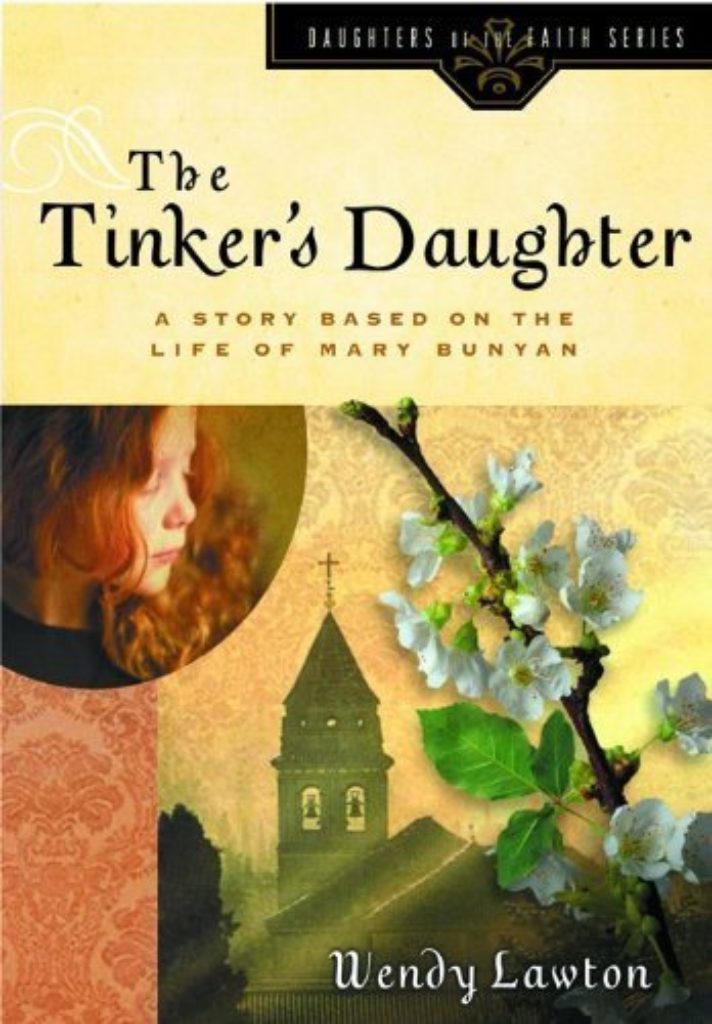The Tinker’s Daughter: A Story Based on the Life of Mary Bunyan by Wendy Lawton has been reviewed by Focus on the Family’s marriage and parenting magazine. It is the third book in the “Daughters of the Faith” series.

The Tinker’s Daughter: A Story Based on the Life of Mary Bunyan by Wendy Lawton has been reviewed by Focus on the Family’s marriage and parenting magazine. It is the third book in the “Daughters of the Faith” series.
Ten-year-old Mary is poor, blind, stubborn and fiercely protective of her family. When her father, the famous preacher John Bunyan (who wrote Pilgrim’s Progress), is arrested for unlawful preaching, Mary is entrusted with the care of the family. This is no small task, given that the family includes a baby brother, a younger brother, a younger sister and a young pregnant stepmother. Still, Mary takes her job seriously and resolves to provide for the family, get her wayward brother in line and dutifully take food to her father every day. Only after a series of hardships does Mary come to understand what her father means when he encourages her to rely on the Lord for her strength. This conclusion ties together the themes of determined individualism and finding the right path.
For readers who are fans of this series, this story may seem slightly out of place. While other books allow the reader to see the heroine grow over the course of years, this book focuses on a specific and short period in Mary’s life. Although this book does not show Mary reaching a major turning point, it does reveal the growth of her faith.
Mary’s father is a man of strong faith who has tried to teach his children not to shrink from standing up for the truth. He is open about his testimony and how God changed him from being a foul-mouthed hooligan into an evangelist. When Mary visits him in jail, he thanks God and tries to make his daughter understand that she cannot do everything on her own.
A gypsy character named Timoz tells Mary how listening to her father made him see his own need for Christ. Timoz presents the Gospel and tells how it changed his life. The next day, Sofia, who is another gypsy, prays to accept Christ, too.
Mary embraces Philippians 4:13, which tells her she can do all things through Christ who strengthens her. Initially, however, she only repeats the first part. This fits in with her self-image and determination, but until she learns that she can only do all things through Christ’s strength, she is misguided. Sofia tries to explain it to her, but Mary has to learn it on her own. When Mary puts her faith completely in Christ, Sofia is thrilled.
None
Mary is close to her father, and she shows him great love and respect. He is very warm and understanding but also seizes teachable moments to share biblical truth with her. Mary is polite to Elizabeth, her stepmother, but does not really embrace her as part of the family until the end of the book. Afraid that loving Elizabeth will lessen her love for her own deceased mother, Mary holds back. At the end of the story, she acknowledges Elizabeth as the head of the house in John’s absence.
The word ‘swounds appears in the book; while the word is not used anymore, it was considered vulgar during this time period. Also, the gypsies are called names such as “scum,” “gypsy spawn” and “Christ killers.”
A boy named Gifre, who is Mary’s brother’s friend, bullies Mary. Gifre is cruel to Mary, setting out dried peas to make her fall, shooting gravel at her with a peashooter, and even catapulting a branch at her face that knocks her over and injures her.
None
Get free discussion questions for this book and others, at FocusOnTheFamily.com/discuss-books.
You can request a review of a title you can’t find at reviewrequests@family.org.
Book reviews cover the content, themes and worldviews of fiction books, not their literary merit, and equip parents to decide whether a book is appropriate for their children. The inclusion of a book’s review does not constitute an endorsement by Focus on the Family.